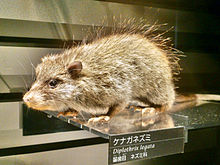Ryukyu long-tailed giant rat
Appearance
(Redirected from Diplothrix legata)
| Ryukyu long-tailed giant rat Temporal range:
| |
|---|---|

| |
| Stuffed specimen. Exhibit in the National Museum of Nature and Science, Tokyo, Japan. | |
| Scientific classification | |
| Domain: | Eukaryota |
| Kingdom: | Animalia |
| Phylum: | Chordata |
| Class: | Mammalia |
| Order: | Rodentia |
| Family: | Muridae |
| Genus: | Diplothrix |
| Species: | D. legata
|
| Binomial name | |
| Diplothrix legata (Thomas, 1906)
| |
| Synonyms[1][2] | |
| |
The Ryukyu long-tailed giant rat or Ryukyu rat (Diplothrix legata) is a species of rodent in the family Muridae. It is the only extant species in the genus Diplothrix. It is found only in the Ryukyu Islands of Japan. Its natural habitat is temperate forests.
Conservation
[edit]The species is threatened by habitat loss, predation by feral cats (with studies finding that the rat contributed 23% of feral cat's diet on Amami-Oshima),[3] and introduced nematode and helminth parasites.[4][5]
References
[edit]- ^ a b Ishii, N. (2016). "Diplothrix legata". IUCN Red List of Threatened Species. 2016: e.T6671A22459891. doi:10.2305/IUCN.UK.2016-2.RLTS.T6671A22459891.en. Retrieved 16 November 2021.
- ^ Diplothrix legata. pir.uniprot.org
- ^ Shionosaki, K.; Yamada, F.; Ishikawa, T.; Shibata, S. (2015). "Feral cat diet and predation on endangered endemic mammals on a biodiversity hot spot (Amami–Ohshima Island, Japan)". Wildlife Research. 42 (4). doi:10.1071/WR14161.
- ^ Okano, T.; Haga, A.; Mizuno, E.; Onuma, M.; Nakaya, Y.; Nagamine, T. (2014). "Angiostrongylus cantonensis (Nematoda: Metastrongylidae) in the Ryukyu Islands Tree Rat (Diplothrix legata)". Journal of Wildlife Diseases. 50 (2): 322–325. doi:10.7589/2013-03-050.
- ^ Tokiwa, T.; Yoshimura, H.; Ito, K.; Chou, S.; Yamamoto, M. (2020). "Alien parasitic infections in the endangered Ryukyu long-furred rat (Diplothrix legata) on Amami-Oshima Island, Japan". Parasitology International. 76: 102058. doi:10.1016/j.parint.2020.102058.
- Musser, G. G.; Carleton, M. D. (2005). "Superfamily Muroidea". In Wilson, D. E.; Reeder, D. M. (eds.). Mammal Species of the World: A Taxonomic and Geographic Reference (3rd ed.). Johns Hopkins University Press. pp. 894–1531. ISBN 978-0-8018-8221-0. OCLC 62265494.
External links
[edit]Wikimedia Commons has media related to Diplothrix legata.

